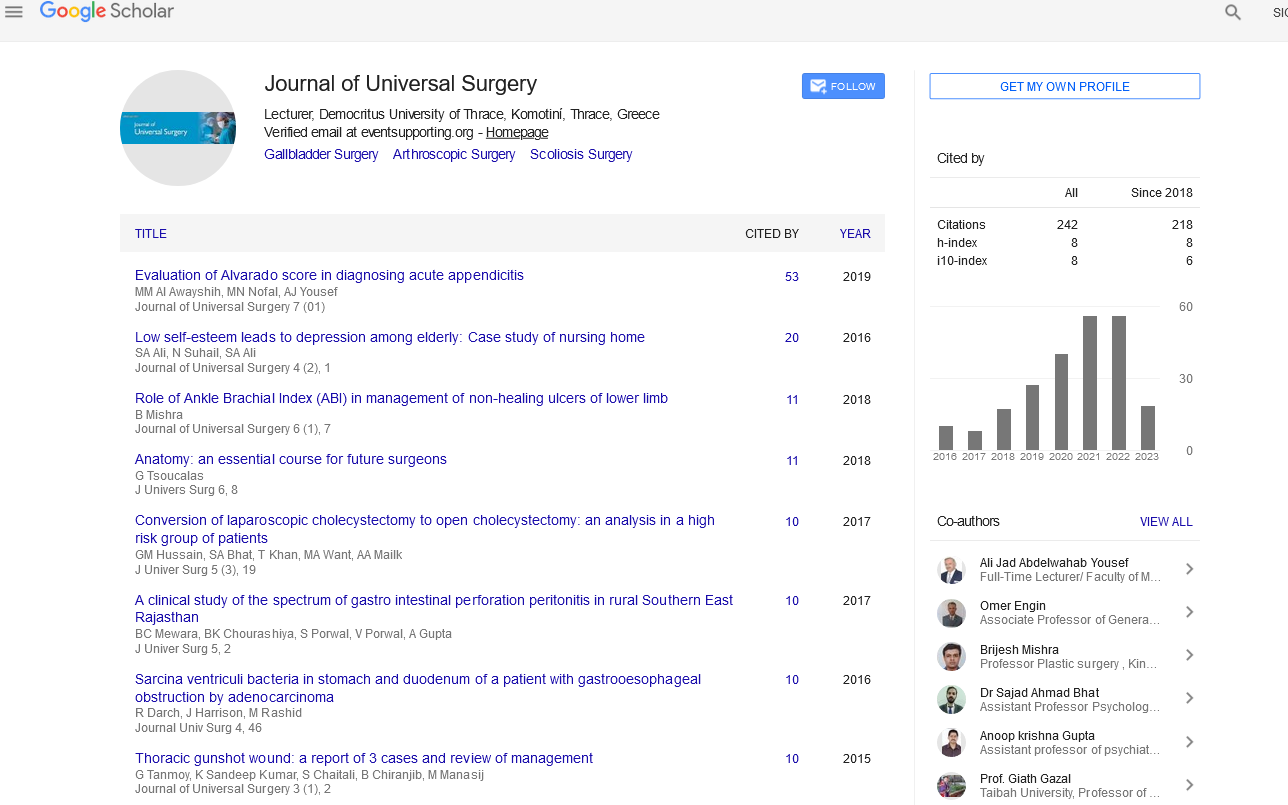Perspective - (2024) Volume 12, Issue 6
Things to Consider Before Having Arthroscopic Knee Surgery
Anouk Hofer*
Department of Orthopedics, University of Seefeld, Seefeld, Australia
*Correspondence:
Anouk Hofer, Department of Orthopedics, University of Seefeld, Seefeld,
Australia,
Email:
Received: 26-Nov-2024, Manuscript No. IPJUS-24-15372;
Editor assigned: 29-Nov-2024, Pre QC No. IPJUS-24-15372 (PQ);
Reviewed: 13-Dec-2024, QC No. IPJUS-24-15372;
Revised: 21-Dec-2024, Manuscript No. IPJUS-24-15372 (R);
Published:
29-Dec-2024
Introduction
Arthroscopic knee surgery is a minimally invasive procedure
used to diagnose and treat issues within the knee joint. Despite
its minimally invasive nature, thorough preparation is crucial to
ensure a smooth surgical process and optimal recovery. Below
are the key precautions to take before undergoing arthroscopic
knee surgery, providing both patients and healthcare providers
with a comprehensive guide.
Description
Detailed consultation with the surgeon
The initial step before any surgery involves a detailed
discussion with your orthopedic surgeon. This consultation
ensures the patient understands the procedure, including its
goals, benefits, and potential risks. Patients should ask questions
about recovery timelines, expected outcomes and alternative
treatments if available. Transparency during this discussion
allows for informed decision-making.
Medical history assessment
Patients must provide a comprehensive account of their
medical history, including:
Chronic conditions: Disclose illnesses like diabetes,
hypertension or heart disease, which could impact surgical
safety and recovery.
Medications: List all medications, including over-the-counter
drugs, vitamins, and supplements. Some medications, such as
blood thinners, may need to be paused.
Allergies: Inform the medical team about any known allergies,
particularly to anesthesia or medications.
This information helps the surgical team tailor the procedure
to the patient's specific health profile.
Physical examination and preoperative testing
A thorough physical examination is conducted to ensure the
patient is fit for surgery. This may include:
Blood tests: To assess overall health and rule out infections or
clotting issues.
Imaging tests: X-rays or MRI scans to confirm the diagnosis
and plan the procedure.
EKG or heart evaluation: For patients with a history of cardiac
issues.
These tests help in identifying and mitigating potential risks
before surgery.
Weight management and fitness
Excessive weight can strain the knee joint and prolong
recovery. Patients who are overweight may be advised to lose
some weight before surgery. Additionally, engaging in light
exercises or physical therapy can strengthen the muscles around
the knee, enhancing post-surgical recovery.
Smoking and alcohol cessation
Both smoking and excessive alcohol consumption can
adversely affect surgical outcomes:
Smoking: Delays wound healing and increases the risk of
infections.
Alcohol: Can interact negatively with anesthesia and
medications.
Patients should ideally quit smoking at least four weeks
before the surgery and avoid alcohol in the days leading up to
the procedure.
Dietary adjustments
A balanced diet rich in vitamins, minerals, and proteins helps
prepare the body for surgery. Patients may need to fast for
several hours before the procedure to prevent complications
with anesthesia. Surgeons typically provide specific instructions
regarding preoperative fasting.
Medications and supplements
Certain medications and supplements can increase bleeding
risk or interfere with anesthesia. Common precautions include:
Pausing blood thinners: Medications like aspirin and warfarin
are usually stopped several days before surgery.
Avoiding herbal supplements: Products like ginkgo biloba,
garlic and ginger should be discontinued, as they can affect
blood clotting.
Always consult with the surgeon before making any changes
to medication routines.
Anesthesia preparation
Anesthesia plays a vital role in pain management during
surgery. Patients will meet with an anesthesiologist to discuss:
Type of anesthesia: General or regional anesthesia is
commonly used.
Previous experiences: Any history of adverse reactions to
anesthesia.
Instructions: Guidelines about eating, drinking and
medication adjustments.
Clear communication with the anesthesiologist ensures a
safer procedure.
Mental and emotional preparation
Surgery can be a source of anxiety for many patients. Taking
steps to address mental well-being is essential:
Understanding the procedure: Familiarity with what to expect
reduces fear.
Relaxation techniques: Practices like meditation or deep
breathing can alleviate stress.
Support system: Having friends or family members involved in
the process provides reassurance.
A calm and positive mindset contributes significantly to
overall readiness.
Arranging post-surgery assistance
Patients will need support after the procedure, particularly in
the initial recovery phase. Before surgery, arrange for:
Transportation: Someone to drive you home after the
procedure.
Home modifications: Adjustments like removing tripping
hazards and installing grab bars.
Help with daily activities: Assistance with tasks like meal
preparation and dressing.
Planning ahead ensures a smoother transition into recovery.
Compliance with pre-surgical instructions
Surgeons provide specific preoperative instructions tailored to
each patient. These may include:
Hygiene practices: Using antiseptic soaps to reduce the risk of
infection.
Clothing: Wearing loose, comfortable clothing on the day of
surgery.
Medication timing: Taking prescribed medications at specified
times.
Following these guidelines meticulously is critical for a
successful outcome.
Emergency contingency planning
Although complications are rare, it’s wise to prepare for
unforeseen circumstances. Ensure you have:
Emergency contacts: Numbers for your surgeon and medical
team.
Insurance information: Updated documentation for hospital
records.
Being proactive minimizes delays in addressing any
unexpected issues.
Conclusion
Taking these precautions before arthroscopic knee surgery
enhances safety, minimizes complications and supports faster
recovery. By adhering to the guidance provided by healthcare
professionals, patients can approach the procedure with
confidence and optimism, setting the stage for successful
surgical outcomes and improved knee function.
Citation: Hofer A (2024) Things to Consider before Having Arthroscopic Knee Surgery. J Univ Surg Vol.12 No.6: 055.





